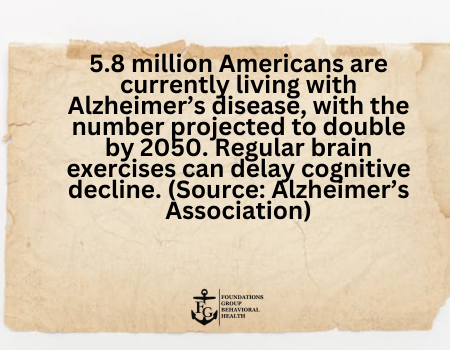In today’s world, mental sharpness and cognitive health are just as important as physical fitness. Our brains thrive on stimulation, and without it, they can become less agile over time. Neurobics—a term coined by Dr. Lawrence Katz and Manning Rubin—describes brain exercises designed to stimulate new neural connections, challenge cognitive abilities, and improve mental health. These exercises introduce novelty and complexity into everyday tasks to keep your mind sharp and flexible.
At Foundations Group Behavioral Health, we emphasize holistic approaches to mental health care. Neurobic exercises can complement evidence-based treatments offered through our Psychiatric Day Treatment, Half-Day Treatment Programs, and Outpatient Mental Health Programs, empowering individuals to achieve cognitive resilience and emotional well-being.
What Are Neurobics?
Neurobics, derived from the word “aerobics,” are exercises for the brain aimed at enhancing neuroplasticity—the brain’s ability to form new neural connections. Unlike routine activities, neurobic exercises require your brain to think in unconventional ways, engage multiple senses, and adapt to new challenges.
How Neurobics Work
Neurobics encourage your brain to:
- Break Out of Routine: Doing things differently forces your brain to process information in new ways.
- Engage Multiple Senses: Activities that combine touch, sight, smell, or sound enhance sensory integration and cognitive flexibility.
- Form New Neural Pathways: Novel challenges stimulate the brain to create and strengthen connections between neurons.
The Benefits of Neurobics
Neurobics aren’t just fun; they offer tangible benefits for mental and emotional health:
- Improved Cognitive Function
Regular brain exercises enhance memory, focus, and problem-solving abilities. - Reduced Cognitive Decline
Neurobics can delay the onset of age-related conditions such as dementia or Alzheimer’s disease by keeping the brain active and adaptable. - Emotional Resilience
Challenging your brain promotes emotional stability and reduces symptoms of anxiety and depression. - Increased Creativity
Engaging in activities that require novel thinking enhances creativity and adaptability in problem-solving. - Better Mental Health
By stimulating positive brain activity, neurobics can complement therapies for conditions like anxiety, depression, and co-occurring disorders.
Examples of Neurobic Exercises
Incorporating neurobics into your daily routine doesn’t require expensive tools or significant time. Here are practical ways to keep your brain sharp:
1. Change Your Routine
- Use your non-dominant hand for tasks like brushing your teeth or eating.
- Rearrange furniture in your home to create a fresh environment.
- Take a different route to work or the store to challenge your spatial awareness.
2. Engage Your Senses
- Close your eyes while identifying objects by touch or smell.
- Listen to a new genre of music and focus on the instruments or lyrics.
- Experiment with new foods or spices to stimulate your taste buds.
3. Learn New Skills
- Take up a hobby, such as knitting, painting, or gardening.
- Learn a musical instrument or a new language to engage multiple brain areas.
- Try puzzles like crosswords, Sudoku, or logic games to enhance problem-solving skills.
4. Social Interactions
- Meet new people and engage in meaningful conversations.
- Play social games like charades or trivia that require quick thinking and collaboration.
5. Practice Visualization
- Imagine completing a task step-by-step in your mind, such as planning a trip or redesigning a room.
- Visualize familiar places, such as your childhood home, and recall as many details as possible.
6. Physical and Cognitive Challenges
- Combine physical activity with cognitive tasks, such as learning a dance routine or playing a sport that requires strategy.
- Try balancing exercises while solving mental math problems.
How Neurobics Complement Mental Health Treatment
For individuals managing mental health conditions such as anxiety, depression, or co-occurring disorders, neurobic exercises can provide additional support in the healing process.
1. Anxiety
Neurobics help shift focus away from intrusive thoughts and promote mindfulness. Engaging in challenging yet achievable activities fosters a sense of accomplishment and reduces anxiety symptoms.
2. Depression
Learning something new or breaking out of routines stimulates the brain’s reward system, which can alleviate feelings of hopelessness and improve mood.
3. Co-Occurring Disorders
Individuals with mental health conditions and substance use disorders can benefit from neurobics by rebuilding cognitive function and improving decision-making skills.
Integrating Neurobics into Professional Mental Health Care
At Foundations Group Behavioral Health, we integrate neurobic principles into our comprehensive mental health programs to enhance cognitive and emotional resilience.
1. Psychiatric Day Treatment
- Intensive, structured care for individuals with significant mental health challenges.
- Neurobic exercises can be incorporated into therapy sessions to improve focus, memory, and emotional regulation.
2. Half-Day Treatment Programs
- Designed for those balancing treatment with daily responsibilities.
- Focuses on cognitive stimulation, stress management, and mindfulness practices.
3. Outpatient Mental Health Programs
- Offers flexibility for individuals with mild to moderate symptoms.
- Combines therapy with neurobic exercises to enhance mental health and cognitive function.
4. Co-Occurring Disorder Treatment Programs
- Addresses the intersection of mental health and substance use challenges.
- Neurobic activities help rebuild neural pathways affected by addiction and stress.

Tips for Incorporating Neurobics into Your Routine
- Start Small
Begin with one or two neurobic exercises each day, gradually incorporating more variety. - Make It Fun
Choose activities you enjoy to ensure consistency and long-term engagement. - Challenge Yourself
Opt for tasks that require effort and novelty to maximize cognitive growth. - Combine Neurobics with Therapy
Incorporate neurobic exercises into your mental health treatment plan for a holistic approach to wellness.
Breaking Routines: The Key to Brain Fitness
Routine tasks, while comforting, allow the brain to operate on autopilot. Neurobics force your brain to process information in new and creative ways, building resilience and adaptability. For example:
- Trying to navigate your home in the dark challenges your spatial awareness.
- Learning to cook a new recipe from memory requires focus, problem-solving, and sensory engagement.
These simple changes can make a significant difference in your cognitive fitness over time.
How Foundations Group Behavioral Health Can Help
Located in Massachusetts, Foundations Group Behavioral Health is dedicated to supporting mental health and cognitive wellness through evidence-based care and holistic approaches.
What We Offer:
- Personalized Treatment Plans: Tailored to your unique needs and mental health goals.
- Comprehensive Services: From Anxiety Treatment Programs to Depressive Disorder Treatment Programs, we provide a wide range of therapies.
- Expert Clinicians: Our team integrates cutting-edge techniques, including neurobic exercises, to enhance therapeutic outcomes.
Take the First Step Toward Mental Sharpness and Wellness
Neurobics offer a simple yet powerful way to keep your brain sharp and resilient. Whether you’re managing a mental health condition or looking to enhance cognitive fitness, incorporating brain exercises into your daily routine can significantly improve your quality of life.
At Foundations Group Behavioral Health, we’re here to help you on your journey. With programs like Psychiatric Day Treatment, Half-Day Treatment Programs, and Outpatient Mental Health Programs, we provide the tools and support you need for long-term well-being.
Contact us today at 888.685.9730 to learn more about our services and start your journey to better mental health and sharper cognition.
FAQ on Neurobics
How do neurobic exercises work?
Neurobics work by challenging the brain to process information in new ways, engaging multiple senses, and encouraging the formation of new neural connections to improve memory, focus, and adaptability.
What are examples of neurobic exercises?
Examples include using your non-dominant hand for tasks, learning a new skill, engaging multiple senses (e.g., smelling and touching new objects), solving puzzles, and practicing mental visualization.
Who can benefit from neurobics?
Everyone can benefit from neurobics, but they are particularly helpful for individuals managing anxiety, depression, or cognitive challenges. They also help reduce the risk of cognitive decline in aging adults.
How do neurobics complement mental health treatment?
Neurobic exercises promote cognitive resilience and emotional well-being, complementing therapies for conditions like anxiety and depression. Programs like Psychiatric Day Treatment and Outpatient Mental Health Programs often incorporate brain-stimulating activities.
How often should I do neurobic exercises?
Engaging in neurobic exercises for 15–30 minutes daily can significantly improve cognitive health over time.
Can neurobics help with conditions like anxiety and depression?
Yes, neurobics can reduce symptoms of anxiety and depression by promoting mindfulness, stimulating the brain’s reward system, and fostering a sense of achievement.








